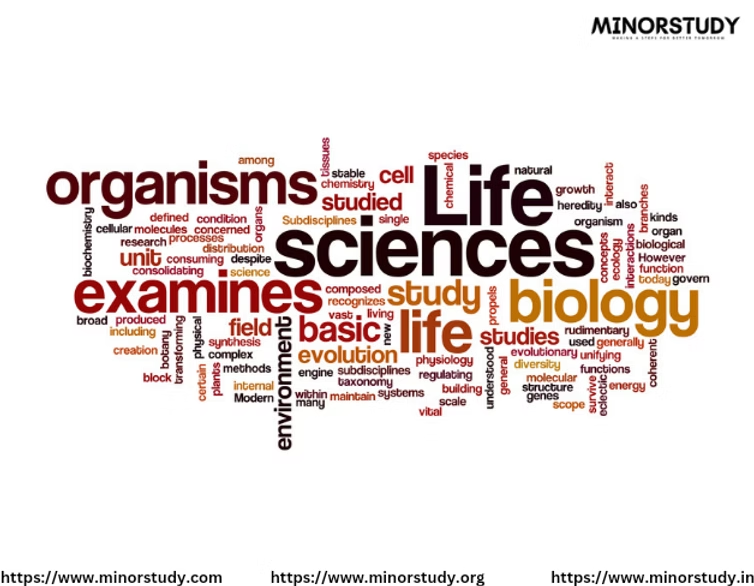Bachelor of Science (BSc) / Bachelor of Arts (BA) in Biology
Faculty: Science Type: Bachelor Major, Minor
The Bachelor of Science (BSc) / Bachelor of Arts (BA) in Biology program offers a comprehensive study of life sciences, focusing on the molecular, cellular, ecological, and evolutionary aspects of living organisms. This degree equips students with a deep understanding of biological systems and prepares them for careers in research, healthcare, education, environmental sciences, and various industries. The program is offered as both a Major and a Minor, allowing students to tailor their education based on their academic and career goals.
Key Learning Outcomes
Comprehensive Understanding of Biology: Gain foundational knowledge in biology, from molecular biology to ecology, physiology, and evolution.
Scientific Research Skills: Develop the ability to design and conduct experiments, analyze data, and interpret biological research findings.
Critical Thinking: Learn to apply critical thinking to analyze biological phenomena and solve complex biological problems.
Laboratory and Fieldwork Proficiency: Gain hands-on experience through laboratory experiments and field studies, learning to use advanced scientific equipment and techniques.
Ecological and Evolutionary Awareness: Understand ecological relationships, evolutionary principles, and the impact of environmental changes on ecosystems.
Core Curriculum
The curriculum for both BSc and BA in Biology includes courses in various subfields of biology, with a focus on both theoretical knowledge and practical applications.
Foundational Courses
Introduction to Biology
An overview of key biological principles, including cell structure, genetics, evolution, and ecology.
Cell Biology
Study of the structure and function of cells, including cellular processes, molecular biology, and genetics.
Genetics
Exploration of inheritance patterns, molecular genetics, genetic engineering, and biotechnology.
Ecology
Examination of ecological principles, ecosystems, and environmental interactions among organisms.
Intermediate Courses
Physiology
Study of the physiological processes in plants and animals, including homeostasis, metabolism, and organ systems.
Biochemistry
Introduction to the chemical processes that occur within living organisms, focusing on biomolecules like proteins, lipids, and nucleic acids.
Microbiology
Study of microorganisms, including bacteria, viruses, fungi, and their roles in health, disease, and the environment.
Evolutionary Biology
Understanding of evolutionary mechanisms, natural selection, speciation, and the history of life on Earth.
Advanced Topics
Molecular Biology
Study of molecular genetics, gene expression, and biotechnology applications such as cloning and gene editing.
Developmental Biology
Exploration of the processes that guide the growth and development of organisms, from fertilization to adulthood.
Environmental Biology
Examination of the relationship between organisms and their environment, including conservation, biodiversity, and environmental challenges.
Biotechnology
Application of biological principles in technology, including genetic modification, pharmaceutical development, and agricultural innovations.
Practical Experience (Lab and Fieldwork)
Laboratory Work
Hands-on experiments in cell biology, microbiology, genetics, and other areas of biology to develop practical laboratory skills.
Fieldwork
Opportunities for field-based research in ecology, environmental biology, and conservation, enabling students to study ecosystems and wildlife in their natural habitats.
Capstone or Research Project (optional)
An opportunity to conduct independent research in a specific area of biology, guided by faculty mentors, and present findings in a thesis or report.
Skills Acquired
Research and Analytical Skills: Ability to conduct biological research, analyze experimental data, and apply scientific methods.
Laboratory Techniques: Proficiency in using laboratory equipment, conducting experiments, and analyzing biological samples.
Critical Thinking: Strong problem-solving skills for analyzing biological questions and drawing evidence-based conclusions.
Communication: Ability to present research findings clearly, both orally and in writing, to diverse audiences.
Teamwork: Collaborative skills for working effectively in laboratory groups, field research teams, and academic settings.
Career Opportunities
A BSc or BA in Biology opens the door to a wide range of careers in scientific research, healthcare, environmental science, and other fields. Graduates can pursue careers in:
Healthcare
Roles in medicine, medical research, public health, and laboratory technology. Graduates can pursue medical school, dental school, or work as lab technicians, clinical researchers, or healthcare consultants.
Environmental Science and Conservation
Work as ecologists, environmental consultants, wildlife biologists, or conservation officers, focusing on ecosystem management, biodiversity, and sustainability.
Research
Positions in research institutions, universities, or biotechnology companies, conducting experiments and studies in various biological fields.
Biotechnology and Pharmaceuticals
Roles in biotechnology firms or pharmaceutical companies, working on drug development, genetic engineering, and clinical trials.
Education
Teaching biology at the secondary or postsecondary level, or working in science outreach programs and educational research.
Agriculture and Food Industry
Careers in agricultural research, plant biology, pest management, and food safety.
Government and Policy
Opportunities in environmental policy, public health, or regulatory agencies that require biological expertise to inform decisions on conservation, health, and science.
Why Choose This Degree?
Versatility: A Biology degree offers a broad foundation in the life sciences, preparing students for various careers in science, healthcare, and policy.
Hands-on Learning: Through laboratory work, field studies, and research projects, students gain practical experience in scientific techniques and methodologies.
Growing Fields: Biology is a rapidly evolving field, with new developments in areas like biotechnology, environmental conservation, and healthcare.
Scientific Curiosity: Ideal for students who have a passion for understanding the natural world, from molecular biology to global ecosystems.
Conclusion
A Bachelor of Science (BSc) or Bachelor of Arts (BA) in Biology provides students with a strong foundation in the biological sciences, equipping them with the knowledge and skills needed to pursue a variety of rewarding careers. Whether opting for the BSc for a more scientific, research-focused path or the BA for a broader, interdisciplinary approach, students gain valuable skills in research, data analysis, and critical thinking. With the ever-growing demand for biological expertise in areas such as healthcare, environmental science, and biotechnology, a degree in Biology offers exciting opportunities to make a significant impact in a wide range of fields.








